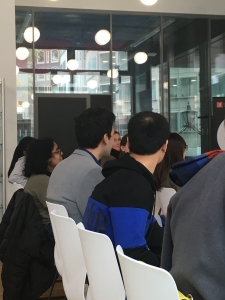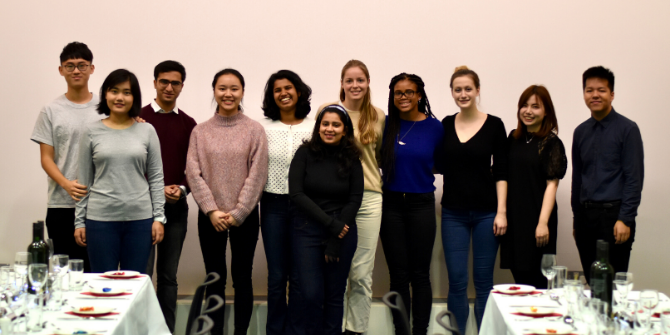There can be controversy surrounding the idea that volunteering is beneficial to your career. There is a suggestion that people should volunteer for others, not just to improve their opportunities. Connected to this is the myth that student volunteers only volunteer to put something on their CVs. However, volunteering isn’t a ‘zero-sum game’ and everyone can gain. Our research shows that the top three motivations for LSE students to volunteer are ‘to improve things’, ‘to give back to society’ and ‘my personal values’.
However, there is no denying that volunteering is still an amazing experiential learning opportunity and the  skills and experiences gained are something employers are often looking for. So last year, we invited a panel of professionals to help us explore how volunteering can help someone’s career journey and provide an opportunity for student volunteers to ask questions. We were joined by James Cook (partner at Collyer Bristow LLP), Carole Reniero (London Programmes and Coaching Lead at CoachBright), Hannah Baker (Product Controller at Goldman Sachs), Rosanna Hutchings (Volunteer Coordinator at the Literacy Pirates) and Alex Selway (Policy Advisor at the Department for Business, Energy and Industrial Strategy). The following shows some of the key questions asked and what our panellists fed back to the students.
skills and experiences gained are something employers are often looking for. So last year, we invited a panel of professionals to help us explore how volunteering can help someone’s career journey and provide an opportunity for student volunteers to ask questions. We were joined by James Cook (partner at Collyer Bristow LLP), Carole Reniero (London Programmes and Coaching Lead at CoachBright), Hannah Baker (Product Controller at Goldman Sachs), Rosanna Hutchings (Volunteer Coordinator at the Literacy Pirates) and Alex Selway (Policy Advisor at the Department for Business, Energy and Industrial Strategy). The following shows some of the key questions asked and what our panellists fed back to the students.
What skills can you gain from volunteering?
The panel acknowledged that there was a plethora of hard skills that could be gained from specific volunteering, that not only give you a taste of a potential career but can also broaden your portfolio of skills. However, the focus of this answer seemed to be how these experience give an indispensable chance to develop multiple soft skills, especially those relating to communications. Hannah drew upon her experience volunteering with the Widening Participation scheme, whilst studying for her BSc Accounting and Finance degree, and how this gave her the chance to connect with different groups of people. Being able to tailor her communications style to different audience became a useful tool in her current job at Goldman Sachs.
Volunteering roles come in all shapes and size, but mentoring and advisory roles are particularly prominent, both of which require volunteers who can actively listen. Carole focused on how mentoring with CoachBright allowed her to ‘become more self-aware’ giving her the tools ‘to become an active-listener, something that is so important in my work’. Developing people-skills and strong communication is extremely important for the working world, and these types of opportunities can provide crucial tools to excel.
There are so many volunteering options in London. How do you decide which organisation and role?
Rosanna opened this discussion by bringing up her experience choosing her volunteer position with the Literacy Pirates. She knew that she wanted to work with children and that she was passionate about education, so volunteering with a charity that focused on improving confidence in Literacy (English) in 9-11 year-olds fitted well with this. Because her career motivations and passions were aligned, she felt that she was able to be more strategic when choosing where to give her time. James echoed this, as he spoke about his work with the Richmond Legal Advice Service, a charity offering free legal advice via weekly drop-in advice sessions. In wanting to develop his soft skills and apply his hard skills he had learnt through his job, he was able to volunteer for something he was also passionate about.
Whilst the subject focused on the link between volunteering and your career, there was a strong recognition across the panel that you should be passionate about the cause that you are volunteering for and not be solely career driven in your search for opportunities. Hannah highlighted that ‘you can just volunteer, because you want to’, as she recalled volunteering with LSE Widening Participation without any consideration of how it would impact her career. This passion will be what motivates you to turn up and give your time and energy, even on a bad day. Being a recent graduate, Alex was able to recommend CareerHub which has over 200 volunteering opportunities on it. ‘If you scroll through, one of them will spark something in you’ he said.
How do I articulate my volunteering on my CV or in an interview?
‘Your CV needs to be concise’ James stressed, as he recommended only putting experiences that were relevant on your CV and not including every single one. Carole echoed this by recognising that whilst you could probably draw one relevant skill from each volunteering experience, CVs need to be tailored to the application. She recommended that if there wasn’t a volunteering experience that was directly relevant, pick one that is engaging (perhaps a little bit unusual) or the one that you are most passionate about.
Having a slightly quirky experience means you’re more likely to be remembered and if you can speak about something passionately in an interview, you’ll be able to build a rapport with the interviewer. As a recruiter himself, James spoke about how he felt that candidates that engaged him in a passionate conversation were more memorable to him in the process and often this came from volunteering experiences.
Whilst being concise is important, Rosanna did add that you shouldn’t dismiss your volunteering experiences in a wider sense. Whilst you might not want to talk about them, you should acknowledge how they might have helped you in some way. For example, during one of her volunteering experiences Rosanna was able to form a relationship with someone senior in the organisation, who then provided her with a great reference in the future for her CV.
Is there a culture of volunteering in your workplace?
The answers to this question were obviously diverse, due to the range of professions and industries represented on the panel. However, the overall consensus was that the world is changing and organisations are becoming increasingly aware of the value of volunteering. At Goldman Sachs, you currently get one day of leave a year to volunteer, but Hannah stressed that it’s all about communication. If you tell your manager that you have a commitment then they should honour it, allowing you to protect that time. But it goes both ways, don’t arrange for volunteering when you know you might be needed at work.
Alex was able to share how his past volunteering as a first aider meant that he could now volunteer as the allocated first aider in his new office. This allowed him to continue volunteering whilst at work, but also gave him the platform to go above and beyond in the work place – giving him a great start to his civil service fast-stream placement. However, the culture of volunteering does change depending on the workplace, which might be something you want to consider when launching yourself into the working world.
Closing top tips from our panellists
At the end of the discussion, the panel were asked what their one top tip for utilising your volunteering to help your career journey was.
- James focused on using your volunteering as a networking opportunity, and using the time to build relationships outside of your usual circle.
- Rosanna seconded James by encouraging volunteers to make use of the time around the impressive people who run the charities they are volunteering for. She highlighted that it was a chance to ask someone in the ‘real world’ what they do and how they got there.
- Hannah concentrated on how volunteering demonstrates your passion for something you want to do, and how volunteers should use this experience to evidence their commitment.
- Carole’s insightful top tip was simply to allow your volunteering experiences to help you find your own personal purpose.
- Alex drew on one of the key themes of the discussion, stating that his top tip was use the experience to develop invaluable soft skills that you can’t gain anywhere else.
Feeling Inspired?
If we’ve inspired you to volunteer, check out one of our other 200+ ongoing opportunities or book a one-to-one with David Coles, the Volunteer Centre Manager if you have more questions. If you are short on time, then take a look at the one-off opportunities that will return for Michaelmas Term 2019, organised by the LSE Volunteer Centre. And why not follow us on Facebook, Twitter, and Instagram to stay up-to-date with our events and opportunities and read our blog for more volunteering tips and stories.






2 Comments